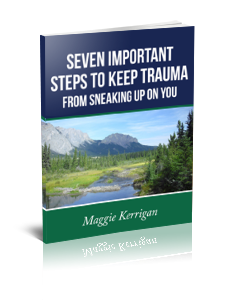Anxiety Treatment
 Anxiety Attacks Take a Toll:
Anxiety Attacks Take a Toll:
Your chest pounds and you cannot breathe. Anxiety or panic attacks hurt and they are scary. They leave you feeling out of control. They appear to be self-perpetuating; just the fear of having an attack prolongs the symptoms.
Do you find yourself in these situations?
- You tremble uncontrollably.
- You gasp for breath.
- You perspire and you are not hot.
- You feel like you could die and this terrifies you.
- You feel ashamed and weak because your body does things you do not want others to see.
- You desperately attempt to avoid activities that could trigger another attack.
Natural Response to Threat
Anxiety is a very common and natural response to threat. When you are faced with a threatening situation your body will rapidly and unconsciously choose the best option to survive the situation. These options include fleeing, fighting or freezing.
While you may feel out of control when the panic occurs does not mean you are weak. Your body is doing its best to get you away from a situation it perceives as dangerous.
Most often, the panic attacks occur because something in the present time reminds your unconscious mind of something dangerous from the past, which you have forgotten. This causes your body to persist in its attempts to get away from danger. Your body wants to get you some place where you are safe and can experience calm.
Anxiety Treatment Guidelines
If you are like many of my clients, anxiety attacks can overwhelm and frighten you. Fortunately, there are several steps to avoid prolonging the attack. I have listed four steps that you may be able to do on your own when an attack occurs.
- If you are unsure if you are experiencing an anxiety attack, have a medical doctor check you out. Serious medical problems can have symptoms similar to an anxiety attack. It is better to not take chances if you are uncertain as to the cause of the discomfort.
- Remind yourself that you will not die from an anxiety attack. Unless there are other serious medical problems that could be triggered by anxiety, the attack will not kill you.
- If you have had more than one anxiety attack, remind yourself that they are usually short in duration. Symptoms usually begin to subside after 10 minutes.
- Redirect your attention to something comforting or pleasant. By shifting your attention away from the anxiety symptoms to something calming, your system will naturally begin to relax. Notice that this approach does not require that you tell yourself to relax; this rarely works and often has the opposite effect.
How to Stop the Attacks?
- Anxiety treatment with a therapist, who uses a body-centered approach, can eliminate or significantly decrease the chance that anxiety attacks will happen again.
- This kind treatment is designed to assist your nervous system to successfully complete the impulse to flee the dangerous situation, even if the danger happened years ago.
- A simple technique of focusing on a minor current event, which led to mild anxiety, can be used as a starting point for completing a flight response that is stuck in your nervous system.
- Unless the body memory is addressed, you may continue to experience symptoms whenever you are exposed to something that reminds you of the earlier threat.
But Wait…
I wake up feeling anxious almost every morning. Can anxiety treatment with a therapist help or should I just take medications?
Chronic anxiety can be challenging because it may seem as though you are anxious about nearly everything. Anxiety treatment that helps you to complete the flight response can be very effective. Whether you also need medications can be influenced by how much the anxiety symptoms interfere with daily functioning including your ability to sleep, concentrate and eat. Generally, however, medication will not address the underlying cause of the anxiety.
I’m 40 years old and life is pretty good except for the anxiety. Should I consider anxiety treatment?
What triggered you to become anxious can be tucked away in your memory. It’s not uncommon to not remember some scary events that, if you had been bigger, stronger or more independent, you would have liked to run from.
In addition, what your mind says is “no big deal” could really have been quite overwhelming. Even fender benders can elicit a flight response.
Case Study
By the time a client, who I will call Julie, came to see me she was having anxiety attacks several times a week. She told me that they usually happened when she was driving to work on the days that her husband was going to be gone for a couple of nights.
We began our sessions by having Julie focus on a pleasant experience that was either real or imaginary. We then closely noted all the signals that her body gave that indicated she was settling. Julie was pleasantly surprised because she had come to think of herself as one jumble of nerves that had to keep moving.
Working with small segments of her story, I first invited her to notice how she felt when she just thought of the possibility that her husband might be leaving for a trip. Immediately, her chest and legs tightened. As she and I watched, her feet began to make small movements, which Julie said reminded her of running. She wanted to run to the safety of her aunt’s house, and, in her mind, she let herself do this. This released a lot of pent-up energy.
Over time as more energy was released, Julie began to grasp a new meaning of her anxious response. When her husband left, it reminded her of the time that her father suddenly left her mother when she was a young girl. At that time, she had nowhere to go to escape her mother’s grief and subsequent depression. The impulse to flee became locked in her nervous system; years later it showed up as anxiety attacks that came when her husband went away.
Choosing a Therapist for Anxiety Treatment
I have years of experience working with many clients who come to me because they want relief from anxiety. I understand the importance of treating anxiety using a body-centered method. While cognitive or behavioral therapies may help you to understand the source of the anxiety, they do very little to eliminate your physical and emotional distress.
I am well suited to a body-centered approach. My training in Somatic Experiencing prepared me to address the deeper causes of anxiety and to help clients to complete the biological impulse to protect the body. As a former massage therapist, I am accustomed to paying attention to the messages the body is conveying about its impulses to move toward health.
What to Do Next?
You may need more information about anxiety treatment. Two very good sources of information are in my free newsletter Healing AfterTrauma and the blogs I write about anxiety and its treatment. You can subscribe by simply completing the boxes on this page. In addition, the resource page can direct you to books and videos you may find helpful.
If you are considering working with me, I offer a 30-minute complementary consult. That way you and I will get to see if we are a good fit for one another. I can be reached at 720-635-7943 or send me an email on my contact page.





